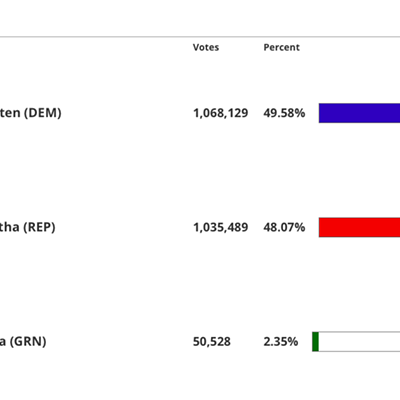On a party line vote last week, the Arizona Senate gave final approval to a bill that would allow surprise inspections of the state's abortion clinics.
The vote was the final step for House Bill 2284, which passed the House of Representatives on March 3.
Gov. Jan Brewer had taken no action on the legislation as of the Weekly's Tuesday deadline.
Rep. Debbie Lesko, who sponsored the legislation, said in a prepared statement that she was "thrilled" by the Senate's vote last Wednesday, April 9.
"This common-sense legislation will protect women and bring abortion clinics up to the same health standards as every other health facility in the state," said Lesko, who cited a 1998 incident in which an Arizona woman died after a botched abortion as a reason that the legislation is necessary.
But representatives from Planned Parenthood Arizona, which operates most of the state's abortion clinics, say the legislation opens the door to harassment by state officials.
"As an organization, we support bills that truly protect patient safety," Planned Parenthood President and CEO Bryan Howard said earlier in the session when the bill passed the House of Representatives. "Our patients are our number one priority, but House Bill 2284 does nothing but open the door to provider and patient harassment. This is yet another law that is in search of a problem rather than a positive solution."
In an interview earlier this year, Howard said that state law already allows unannounced inspections, provided state officials can show cause to believe that state regulations are being violated and get an administrative warrant.
Howard noted that the current staff of the Arizona Department of Health Services has been apolitical and has not sought to harass Planned Parenthood clinics, but "a more political director, if that requirement of having cause is taken away, could easily use that to harass patients by doing unannounced inspections, one after another after another."
The Arizona Legislature passed a similar bill allowing unannounced inspections in 1999, but after a lengthy legal battle, a settlement was reached that required the current standard of requiring state health officials to show cause before they could do unannounced inspections of abortion clinics.
Lesko said that new regulations on abortion clinics have opened the door to allowing surprise inspections despite the earlier court decision, but Jodi Liggett, director of public policy for Planned Parenthood Arizona, said state lawmakers who pushed the legislation on this and other abortion-related issues were "almost begging for litigation, over and over again."
Speaking of litigation over new state laws regarding abortion: Planned Parenthood won a round in court last week when the Ninth Circuit U.S. Court of Appeals issued an injunction preventing the state from instituting new restrictions on the use of medication abortion.
The court order notes that proposed changes to the regulation of abortion-inducing medication "raises serious legal questions regarding the proper application of the 'undue burden' standard to abortion regulations purporting to promote maternal health."
"We also conclude the balance of the hardships tips sharply in favor of the appellants, whose patients will likely suffer irreparable harm absent an injunction pending appeal because they will immediately lose access to a common abortion procedure as soon as the law takes affect."
At issue in the case are new regulations of drugs that induce abortion. In 2012, Republican state lawmakers passed a law requiring that the use of abortion medication follow an FDA protocol that was established when the use of Mifeprex was first approved by the FDA in 2000.
But that protocol required a higher dosage of the medication than is commonly used today and restricted its use to seven weeks into a pregnancy. In the 14 years since the drug has been in use in the United States, physicians have developed what's called "evidence-based protocols," which have shown that the medication is safe to use through the first nine weeks of pregnancy at a lower dosage.
Reverting to the original FDA protocols would restrict the use of the drug during those additional two weeks and require that patients make an additional visit to the doctor—a requirement that can be particularly onerous for women in rural Arizona who must travel to a metropolitan area to have an abortion.
Approximately half the women in Arizona who seek abortions use the medication option rather than a surgical procedure. And until another state law required the same facilities for dispensing the medication as performing a surgical abortion, Planned Parenthood could offer medication abortions in Yuma and Prescott. (Because of those restrictions, abortion services are now only available in Tucson, Maricopa County and Flagstaff.)
Howard praised the court's decision in a prepared statement.
"We are all better off when physicians—and not politicians—decide what care is best for their patients," Howard said. "If implemented, these misguided restrictions would force doctors to provide care to their patient that goes against 14 years of research and practice in the medical field. Planned Parenthood will continue to fights these dangerous restrictions from the state house to the court house."
The Court of Appeals order reversed a decision by a federal judge in Tucson that would have allowed the new regulations to go into effect while the case was under appeal.
Federal courts have blocked a number of anti-abortion and anti-Planned Parenthood laws in recent years, including legislation that would have prevented abortions after 20 weeks of pregnancy and prohibited any federal health-care funds that flow through the states from going to Planned Parenthood, even for services unrelated to abortion.
Oral arguments in the appeal are scheduled in May.










